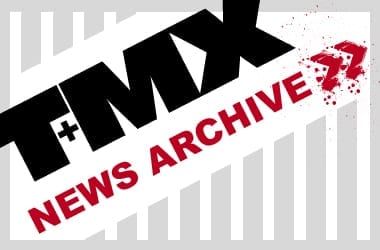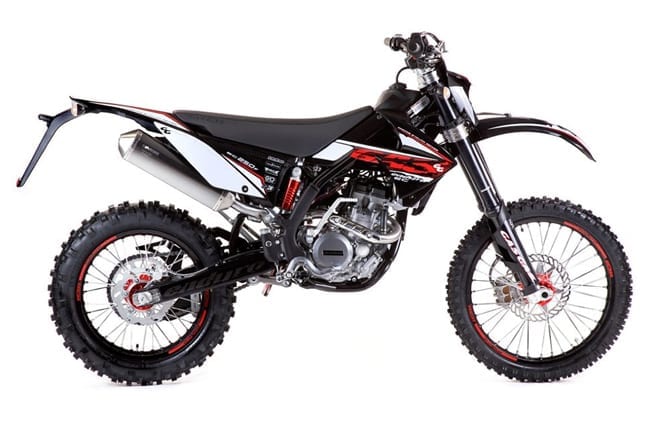On the Gas!
By TMX Archives on 19th Nov 09

GAS GAS is probably still best-known as a leading trials manufacturer (and T+MX printed the 2010 Gas Gas trials test two weeks ago) but over the years it has also firmly established itself as a major player in the enduro/ cross-country marketplace and in Britain, with the recent explosion in hare and hounds racing, the specialist range of two-stroke EC and CC racers from the Gerona-based concern have become class leaders, having won themselves an excellent reputation for performance, rideability and reliability.
For 2010, the well-established strokers have been augmented by an exciting brand new model, the Enduro 4T, which comes with the DOHC five-valve Yamaha engine, dubbed the Gasaha by British importer John Shirt. This combines the Japanese engine technology with the latest lightweight Gas Gas chassis which ought to be a winner on both fronts.
Well, T+MX got to find out when we hit FatCat MotoParc for MARTIN CRAVEN to put the latest uprated 250cc/300cc strokers through their paces alongside the all newYam-engined 250F...
Most off-road riders are, by now, fairly well aware of the Gas Gas two-stroke enduro range. When first introduced, they most certainly weren't the most reliable bikes on the planet BUT, all the bugs were pretty quickly ironed-out and over the last few years have proved to be top sellers with buyers more than happy with the rideability and reliability factor.
The basic chassis layout has been pretty-well settled with a strong but light perimeter style twin-spar frame housing the power-valved two-stroke motors. The two two-strokes on test (250/300) were identical with the only difference being the cylinder bore. The 300 is 'square' at 72mm X 72, with the 250cc bore being reduced to 66.4.
The models as tested were the "CC" (Cross Country) versions as opposed to the EC (Enduro). Basically, the CC is the EC model but with all the homologation gubbins removed. You can still register the bikes for the road in Britain so as far as we are concerned - the CC simply saves you around £300 for what amounts to a box full of bits that you don't really need. Thank John Shirt for that!
For 2010 the Gassers come with a brand new chassis, still in the perimeter style but sporting an interesting new 'B' section tubing that slots into neat castings. Strong but very light. Other changes include new fork clamps in forged aluminium, a new chainguard, a one-piece translucent plastic fuel tank so you can check at a glance how much gas you have left, new tank covers, a slimmer water-pump cover and a plastic crankcase shield.
The four-stroke Yam motor has been eased into the Gas Gas chassis so successfully that it looks custom-made. It is everything that you would expect of a Yamaha and certainly sits perfectly in the Gas Gas range.
SPECIFICATIONS
2010 model Gas Gas EC 250 CC & 300 CC
ENGINE
Type: Liquid-cooled, single-cylinder two-stroke with direct crankcase reed-vale induction and exhaust valve
Capacity: 249.3 cc 297 cc
Bore x Stroke: 66.4 x 72 mm/ 72 x 72 mm
Induction: 38 mm carburettor
Clutch: Multidisc with hydraulic actuation
Gear Box: Six-speed
Transmission: Primary via gears; Secondary via roller chain
Lubrication: 2% Fuel/ oil pre-mix
FRAME
Type: Deltabox manufactured with microfusioand cromoly B- section tubes
SUSPENSION
Front: Sachs inverted 48 mm fork Sachs inverted 48 mm fork
Wheel Travel: 295 mm
Rear: Aluminium progressive system with Sachs monoshock
Wheel Travel: 310 mm BRAKES
Front: 260mm disc with two-piston calliper
Rear: 220mm disc with single-piston calliper
WHEELS
Front: 90x90 - 21'' tyre
Rear: 140x80 - 18'' tyre
ANCILLARIES
Kick Start: Forged aluminium
Brake Pedal: Forged aluminium with retractable tip
DIMENSIONS
Wheelbase: 1,476 mm/ 1,476 mm
Seat Height: 945 mm
Fuel Capacity: 9.5 litres
Dry Weight: 101 kg/ 102 kg
SPECIFICATIONS
2010 model Gas Gas EC 250 4T
ENGINE
Type: Liquid-cooled, single-cylinder four-stroke with DOHC five-valve head
Capacity: 250 cc
Bore x Stroke: 77 x 53.6 mm
Ignition: CDI
Induction: Keihin FCR-MX37 carburettor
Clutch: Oil-covered multidisc with AJP hydraulic actuation
Gear Box: Five-speed
Transmission: Primary via gears; Secondary via roller chain
FRAME
Type: Deltabox manufactured with microfusion and cromoly B- section tubes
SUSPENSION
Front: Marzocchi inverted 48 mm fork
Wheel Travel: 295 mm
Rear: Aluminium progressive system with Sachs moshock
Wheel Travel: 310 mm
BRAKES
Front: 260mm disc with Nissin two-piston calliper
Rear: 220mm disc with Nissin two-piston calliper
WHEELS
Front: 90x90 - 21" Michelin tyre
Rear: 140x80 - 18'' Michelin tyre
ANCILLARIES
Kick Start: Forged aluminium
Brake Pedal: Forged aluminium with retractable tip
DIMENSIONS
Wheelbase: 1,465 mm
Seat Height: 940 mm
Ground Clearance: 370 mm
Fuel Capacity: 6.3 litres
Dry Weight: 110 kg
Specification:
